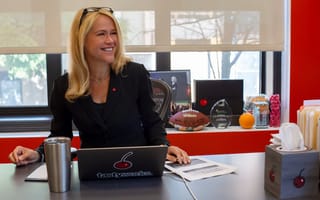It takes a lot to be able to lead a company — courage, business acumen, the ability to stay sane during intense periods of stress, and so much more. The five women founders and CEOs of the following Chicago companies are no stranger to these traits, as well as the immense challenges of running a successful tech company.
What would possess someone to take on such a huge trial, and what lessons have they learned along the way? Let’s find out.

Opportunity is everything. Kristi Ross, co-CEO and president of the financial media company tastytrade, is all about seeing openings and capitalizing on them, which is what she did in pushing her company’s niche offering into the finance world and propelling herself through her professional career.
What inspired you to lead your current company?
Our team has been in and around trading, brokerage and financial markets for decades. We’ve seen and experienced firsthand what was missing in our industry. Financial media was neither fun nor actionable. Over two decades ago, trading technology and online access for self-directed investors sparked the movement to level the playing field between professionals and the everyday investor. Over this past decade, with mobile access and the rise in streaming capabilities, it has created opportunities for fintech companies to develop new products.
We created an ecosystem that combines content, technology, minimal fees, entertainment, and education, which has taken self-directed investing to the next level for all of us. For the whole team at tastytrade, it is about capitalizing on opportunities as the landscape changes — just like in trading.
Don’t wait for someone to craft an opportunity for you.”
What are the most valuable lessons you’ve learned along the way, and how might other women apply these lessons to their own careers?
Opportunity is all around you but you need to pay attention. It doesn’t drop in your lap, you have to grab it. Don’t wait for someone to craft an opportunity for you. I remember first raising my hand when I was 25 years old for a CFO position that I probably wasn’t fully qualified for — but I jumped in anyway. You learn so much more by jumping in and doing, no matter whether you succeed or fail.
I have a few things to note for happiness and success in your career. Do a deep dive into the customer experience. You’ll be amazed at the insights you gain and can contribute if you are the customer. Do your research and know your numbers so that you can add value to any meeting. Find out how success is measured through your high-level company metrics, or those for your department or industry. And if you have not been invited to the table, show interest and ask for the invitation. Be tuned into the team culture and foster an environment that is supportive of personal and professional development — otherwise, rethink why you are there. Additionally, learning something outside of your realm of focus helps you connect the dots in other areas and be more well-rounded. Create a personal goal outside of your everyday work to learn something new.

Jellyvision’s CEO Amanda Lannert has been with the company for almost 20 years, and has seen it transition from offering an outdated technology to providing a “smart” virtual benefits counselor. In that time, she’s learned to appreciate and cultivate the more human elements of working at a company — like fostering an environment where team members can fully be themselves and inspire others to do the same.
What inspired you to lead your current company?
Jellyvision and I have been through a lot together. In 2001, I started as a marketer here, when Jellyvision put all our “business eggs” into the CD-ROM computer game “basket.” Then the internet happened, and CD-ROMs became nearly-instantly obsolete. In short, business death inspired us to change. Thankfully, our ride-or-die founder, Harry Gottlieb, managed to take the basic premise of our games – which were smart, interactive virtual conversations – and spin internet gold. We started helping companies explain complex, important topics to their employees and customers. After seven-and-a-half years of doing the stressful startup thing, we launched ALEX, the software product we’re known for now.
Today, ALEX helps millions of people at companies large and small make better financial decisions about how to choose and use their benefits. More than 1,500 companies trust ALEX to help their employees with over $100 billion dollars of insurance premiums and retirement savings funds. I’d call that pretty inspiring.
We can and should be modeling the welcoming behavior that we wish to see.”
What are the most valuable lessons you’ve learned along the way, and how might other women apply these lessons to their own careers?
Never forget that businesses are made of people — all with rich lives, trying to work together toward a common goal. People want to work with and for people they like and can relate to. But it is also our responsibility to step out of our comfort zones and expand the definition of people we like and relate to.
A dynamic work environment should include celebrations and difficult conversations alike, and people should feel that their whole selves are welcome at work. If they do, they are more likely to enjoy their work, their coworkers, and those hours that they spend under your roof. They will also push themselves and take interesting risks. Many women know what it feels like to compartmentalize our personalities, and this cultural norm is not going to change in a day. But it also means that we can and should be modeling the welcoming behavior that we wish to see.

Chairman and CEO of Braviant Holdings Stephanie Klein wanted to take a risk. She opted out of the comfort and safety of working beneath the umbrella of an established company to take a chance on building a digital lending platform from the ground up. She found fulfillment, growth and trust in herself as a result.
What inspired you to lead your current company?
After launching two internal startups within larger companies, I was ready for a new challenge. Leading an early-stage fintech startup without the safety net of an established company providing capital and other resources was the next logical step. The work we do at Braviant to help underbanked Americans access better credit solutions is challenging, but also immensely rewarding. Our mission to create a 'path to prime' for people with less than perfect credit inspires me every day. Equally inspiring is the opportunity to hire and work alongside some of the best talent in Chicago as we continuously innovate and iterate to create the next generation of digital lending products.
The learning and growth you experience when you step outside your comfort zone is where the magic happens.”
What are the most valuable lessons you’ve learned along the way, and how might other women apply these lessons to their own careers?
A key lesson I’ve learned throughout my career is to trust my own capabilities and say 'yes' to new opportunities, even if they carry the risk of failure. As a general rule, it’s impossible to achieve significant upside in life without taking some risks. I’ve made safe bets in my career and bets where I carefully evaluated the risk-reward trade-off, then decided to go for it. Without a doubt, the choices where I felt like I was jumping into the deep end have paid off tenfold. While it can feel safer to stick to what you know, the learning and growth you experience when you step outside your comfort zone is where the magic happens.

CEO, Founder and Product Architect Talia Mashiach of the events-spending management platform Eved champions the idea of investing in oneself. Doing things like forgiving mistakes, surrounding yourself with reliable people, and pushing back against norms are all things she encourages the next wave of entrepreneurs and tech professionals to do.
What inspired you to launch and lead your current company?
I am really interested in B2B payments for enterprise companies. While there has been significant innovation in fintech for consumers, small and mid-market businesses, there aren’t many fintech companies targeting enterprise because it is very complex and difficult. We love the challenge and while it takes more time, there is a huge opportunity. When you can sit in the middle of a transaction between a buyer and seller, there is so much value that can be delivered and therefore, lots of opportunity for the company.
It is so hard to build a company, so you need people to build you up everyday in order to overcome all the challenges.”
What are the most valuable lessons you’ve learned along the way, and how might other women apply these lessons to their own careers?
Surround yourself with people who give you strength and confidence. This goes from your leadership team, to your investors, friends and family. It is so hard to build a company, so you need people to build you up everyday in order to overcome all the challenges. Great companies are built by teams who have great leaders. Learn to provide a very clear vision and goals, and empower your teams to deliver on them.
You will need to give yourself permission to put your career first and at other points, to put your family first. But don’t be so hard on yourself. We expect ourselves to be perfect but give yourself permission to be human.
Don’t allow anyone to pressure you into doing something 'because that is the way it has been done.' Most of corporate America and venture capital firms are still run by men who have stay-at-home wives. We have the opportunity to change the next generation of companies by creating cultures and policies that respect that our employees have responsibilities at home. People can be top performers without feeling conflicted between their work and home. There is never one way to do something.

CancerIQ CEO and co-Founder Feyi Olopade Ayodele could've remained a bystander in healthcare, but she instead became an active participant when she launched a solution to predict and prevent cancer through genetic testing. It's been far from easy, but she and and her growing team remain steadfast in their mission.
What inspired you to launch and lead your current company?
When I launched CancerIQ in 2013, I was convinced it was the right thing. This was born out of my experience working at the University of Chicago alongside my mother and world-renowned medical oncologist Dr. Olufunmilayo Olopade. During this time, I saw a number of bottlenecks that impeded progress in cancer prevention and limited access to genetically-informed care that could help prevent inherited cancers and save lives. Now, we’ve built a market-leading product that helps providers use genetic information to predict, preempt and prevent disease.
Never lose sight of your purpose.”
What are the most valuable lessons you’ve learned along the way, and how might other women apply these lessons to their own careers?
I’ve learned it’s important to demonstrate the impact of your vision. As a female founder launching a business that predominately affects women, male investors and prospective employees often need outside signals to believe in you. It took closing my first five-figure deal to attract my first set of engineers and investors, and continuing to do that has helped us raise more than $6 million in venture capital and secure partnerships. Never lose sight of your purpose. We’ve experienced rapid growth, and we’ve had to work incredibly hard, but it’s always worth it when we come back to why we exist.







